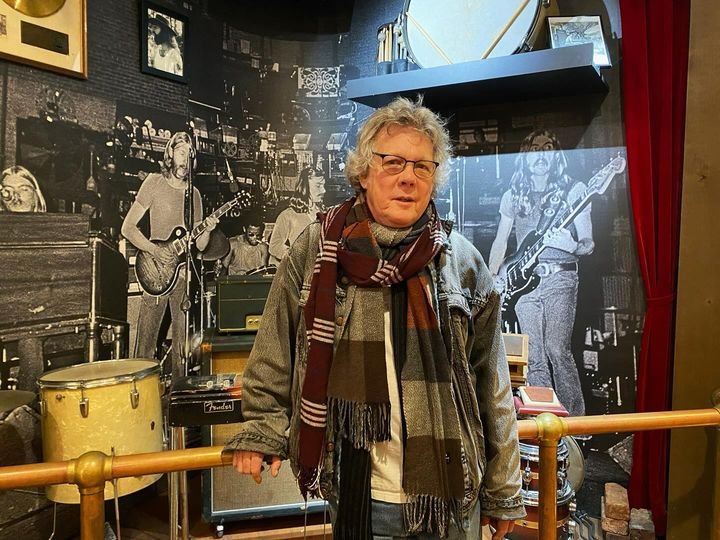Be Careful What You Wish For: The Steep Climb of Singer-Songwriter Steve Forbert
Originally published in July of 1982, this interview with longtime Asbury Park resident Steve Forbert appeared in the Aquarian Weekly. (Used by Permission.)
“I’m not at the top, that’s what I’m saying,” Steve Forbert says in his first interview in a year and a half. We’re sitting in Rocky’s, an Italian restaurant on Mulberry and Spring, having dinner. “I’ve been running up a big bill making these records and I haven’t sold enough to even pay for the cost of making these things. You’ve got to sell a lot of records. A lot! With the music industry what it is today, you’ve got to sell records to hang in.
“I understand,” he says diplomatically, “that the label has bottom line pressure from the board of directors and stockholders, and sooner or later they’ve got to start making x amount of money on a recording artist. So, I just want to say, I‘m glad that people at CBS are enthused and all but I’m still fighting. There’s a certain amount of pressure. But I do think the new album is an entertaining one.
Steve Forbert, the album, his fourth, indeed, is “entertaining,” as he says. In fact, it’s is his best since the groundbreaking Alive On Arrival debut four years ago. If that debut told the story of a young kid up from Meridian Mississippi in the big city for the first time, the new one shows that kid to be in full control of his artistic powers…an entertainer of the highest order.
The last three songs on side one are a trilogy of love lost. Jackie DeShannon’s 1963 classic “When You Walk Into The Room,” also covered by The Searchers and Karla Bonoff plus some foreign language versions, has the singer agog at his love object. “Listen To Me” finds the singer realizing that love is slipping through his fingers, but he’s still optimistic. “Oh So Close (And Yet So Far Away)” has the girl already married to someone else. “I didn’t sequence the album,” admits Forbert. I let [manager] Vince Morrow do that. We finally got the songs the way we wanted. I wrote two of those songs but I never even considered the trilogy aspect.”
(Advertisement) Story continues below…
How much of an album does Forbert keep his hands on? “Oh it’s all me,” comes the quick answer. “I just don’t really care about sequencing. All I wanted was to have `Beautiful Diana’ last. That was my only request. But, ultimately, there’s nothing on the album that I’m not there to approve. I’m there for the mixing to the selection of publicity pictures to the album credits. You’ve got to be there. Otherwise, If you don’t like what happens, it’s your fault. I mean, what if they sent me the tape and I didn’t like it? What if the drums are too loud? That’s a couple of thousand dollars we just spent. I’ve always wondered about artists who say they don’t have that kind of control. Hey, if a company signs an act and they want input into the album cover, for instance, I cannot understand the label saying no. Joni Mitchell was once turned down by a major label because she insisted on doing her own cover artwork.”
PHOTO: Steve Forbert at Allman Brothers Museum
The album starts with big sound. It hits you flush in the face. There’s a lot of music in these grooves with Forbert’s voice more soulful than ever. “You’re Darn Right” is pure country. “Prisoner Of Stardom” is haunting yet Forbert won’t say who it’s about. (“The less I say, the more press can speculate.”) “It Takes A Whole Lotta Help To Make It On Your Own” is gutbucket rock’n’roll. “Beautiful Diana” is a wistful love letter with hoarse sexy vocals. Is “Diana” a real person? “Sure,” he says.
When he first appeared, Forbert was lumped in with a few others as “The New Dylan.” Springsteen and John Prine suffered the same fate. It’s like a millstone around your neck. “I didn’t start that or like it,” he says with a little anger. “It’s been said to my face and I never even nod in return. There’s no validity to something like that. In fact, it’s stupid. They even said I was gonna save rock’n’roll from its own excess. Anyone who would write something like that is just so unimaginative. That `new Dylan’ stuff has become a catch-phrase for every promising singer-songwriter out there and it never does them any good.”
(Advertisement) Story continues below…
“If your debut doesn’t do well, for instance, you get real serious the next time and it brings you into focus. My first record did so well, that when my third didn’t, it was almost good for me in the sense of a wake-up call.”
As a teen, Forbert bashed out loud covers of “Stepping Stone” by The Monkees, “Bringing Home The Bacon” by Procol Harum, “Suffragette City” by David Bowie, “Honky-Tonkin’” by Hank Williams,” “Only A Hobo” by Dylan, “Reach Out I’ll Be There” by The Four Tops and “Don’t Cry No Tears” by Neil Young.” The oddest cover had to be “The Impossible Dream” from the 1965 Man Of La Mancha Broadway musical. “Yeah, man,” he remembers, “that’s where I’m coming from! Anything and everything. I can go from Mary Hopkins to Jimmie Rodgers to Eddie Cochran.”
Upon his 1978 debut, Robert Palmer, writing in the New York Times, was only one of numerous reporters who gushed undeniably in extremely favorable terms to the point where it seemed the 24-year old could do no wrong. Looking back, he concedes now that “it was all too much. At the time, I tried not to think about it. It helped I was so busy. Now I just think it was weird. I mean, you really have to watch when that sort of thing happens right off the bat. You can start to think that you really know what you’re doing. You may not be as careful as you should be about things. You may just think that you know it all. Or you might not even know what it’s worth.”
Forbert now knows the worth of a hit album and popular acceptance. Third album Little Stevie Orbit came out last year to mixed reviews and mediocre sales. To that, he’s philosophical. “You put out an album like Alive On Arrival and people like it and you’ve always wanted to do that and then you actually do it and maybe it just comes a little too easy. I got over-confident. I mean, and I don’t want to sound like I ran out and bought a Rolls Royce but it can get difficult to gauge where you’re really at. If your debut doesn’t do well, for instance, you get real serious the next time and it brings you into focus. My first record did so well, that when my third didn’t, it was almost good for me in the sense of a wake-up call.”
(Advertisement) Story continues below…
This is one Mississippian who wears no cowboy hat and doesn’t fall in line for the “good ol’ boy” routine. “I don’t like that stuff anyway,” he admits. “Sure, I grew up with country music and love to this day Willie, Hank, Merle, Lefty, Waylon and everything in-between from Grand Ol’ Opry star Ernest Tubb to Gram Parsons and Emmylou Harris. But that doesn’t mean I want to be associated with it as an artist. I can’t relate to acting like that, especially on stage. I see all these country singers waving the flag and promising a kick-ass how y’all doing kinda thing. I won’t mention names but it all amounts to nothing but artifice. I do relate to George Jones and Johnny Cash but all them cowboy hatted Southern good ol’ boys with their hell-raisin’ and macho posturing? They don’t need my support anyway.”
Southern Rock audiences can be a beast. Crowds at shows by Hank Williams, Jr. may even be more effusive than Slayer crowds. At the Tenth Anniversary Capitol Theater in Passaic, Forbert, alone with an acoustic guitar and harmonica-holder around his neck, singing sensitive odes to life and love, had to contend with rowdy yokels throwing catcalls his way that drowned out his art. “Plus I had to tape some of the words to my mic stand,” he remembers. “The songs were new and I was afraid I wouldn’t remember them. I didn’t mind the unruly mob right in front of me. I’ve put up with it before. It’s never so bad that it stops my show. People go to have fun. So even if they’re out there talking loud and saying nothing, I take it in stride. Dead silence is much worse. It’s intimidating. I mean, it’s not like I’m reading poetry.”
But in the event of a topical tune like “The Oil Song,” where there’s an implicit message, nobody would want their words-of-wisdom trampled upon. “I suppose,” he surmises. “We had finished the Jackrabbit Slim album and there was another big oil spill and I thought we just had to add it to the album that was already finished. So we put it out as a bonus single within the packaging. Then there was another oil spill that made the first one look like a mud puddle. So I updated the lyrics.”
(Advertisement) Story continues below…
He was a mere 21 when he ventured into the Big Apple from the Deep South. June of ’76. He played in the streets for chump change, participated at hoots in Washington Square Park and, finally, got his shot opening for Folk City headliners. Falling into a clique of like-minded up’n’comers Carolyn Mas, The Roche Sisters, Jack Hardy and George Gerdes, the gigs were plentiful and the artists all supported each other in the same way that, 15 years earlier, in the same exact clubs, Dylan, Phil Ochs, Dave Van Ronk, Tom Paxton, John Hammond, Jr. and Joan Baez did.
“There was a comradeship between us,” he remembers fondly. “Some people had their own groups. I was more of a street-singer paid half the time in beer and pizza. Danny Fields discovered me [the legendary music bizzer who also discovered Iggy Pop, signed the MC5 and managed The Ramones]. Danny got me a CBGB gig. When you have loud amps, it’s hard to do anything but 12-bar blues. The CBGB crowd didn’t know what to make of me. I always felt drums got in the way of the music anyway.”
Forbert’s reveries are cut short by the check. We pay our tab and head out into the warmth of the city. “I’ll be all over the place in July,” he says. “Come and see me.” I ask about non-musical pursuits in the hopes of getting him on a pool table but he declines the offer and answers the final question by telling me he’d like to go snorkling someday.
(Advertisement) Story continues below…
Post Script: Steve Forbert’s current album, Street Of This Town: Revisited, is a keeper. His voice has matured into a sandpapery rasp like an old friend you’re so glad to hear again. He’s be performing May 11 in Roslyn New York at My Father’s Place, now nestled within the Roslyn Hotel Ballroom. On May 18, he be at the Lakehouse Music Academy in Asbury Park. Then, after trips to Mississippi and upstate New York, he’s be back in Asbury Park June 16 at St. John’s Island.



